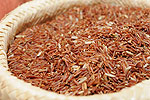 In the next article in my series of how to fight high cholesterol, (for the previous article, you can go here,) I look closer at one of the top supplements available to you. It’s called red yeast rice, and there is some good evidence that it can help. But be sure to read to the end, as you must inform your doctor if you are seeking out these natural supplements.
In the next article in my series of how to fight high cholesterol, (for the previous article, you can go here,) I look closer at one of the top supplements available to you. It’s called red yeast rice, and there is some good evidence that it can help. But be sure to read to the end, as you must inform your doctor if you are seeking out these natural supplements.
In a randomized, placebo-controlled study conducted in China on 5,000 patients with heart disease, Xuezhikang supplements reduced heart attack rate by 45% when compared to placebo treatment. (Xuezhikang is a red yeast rice supplement.) Similar cardiovascular benefits were seen in elderly patients with a history of heart attacks, hypertensive patients with previous heart attacks, and all patients with previous heart attacks.
In a randomized, placebo-controlled study, 62 patients with high cholesterol for whom statin drugs caused too much muscle pain were randomized to receive red yeast rice (1.8 grams, twice a day) or placebo for 24 weeks. The results from this study showed: LDL (bad) cholesterol reduced by 21.3% (red yeast group) vs. 8.7% (placebo group); total cholesterol reduced by 14.9% vs. 5.3%; HDL (good) cholesterol increased by 8.6% vs. 7.9%; and triglycerides reduced by 7.2% (red yeast group) vs. 1.4%(placebo group). Two of 29 patients in the red yeast rice group developed severe muscle pain and had to discontinue the study. Two other patients had to discontinue red yeast rice because of dizziness and loose stools.
In a randomized trial, 74 patients with high cholesterol took either the standard drug treatment with simvastatin (40 milligrams a day) or alternative treatment (therapeutic lifestyle changes; red yeast rice at 2.4 or 3.6 grams a day; fish oil supplements) for eight weeks. It found that LDL cholesterol dropped 42% in the alternative treatment group and 39% in the drug group. As well, triglyceride levels dropped 29% in the alternative group and just 9.3% in the simvastatin group.
Note: Since red yeast rice contains a statin-like chemical, it can produce similar statin-like side effects, including elevated liver enzymes and muscle pain. A chemical toxic to the kidneys called “citrinin” is the result of incorrect rice fermentation processes previously found in several red yeast rice products in the market. Therefore, before you start taking red yeast rice, you should consult with your physician and be prepared to be under medical supervision during the time you take this product.
